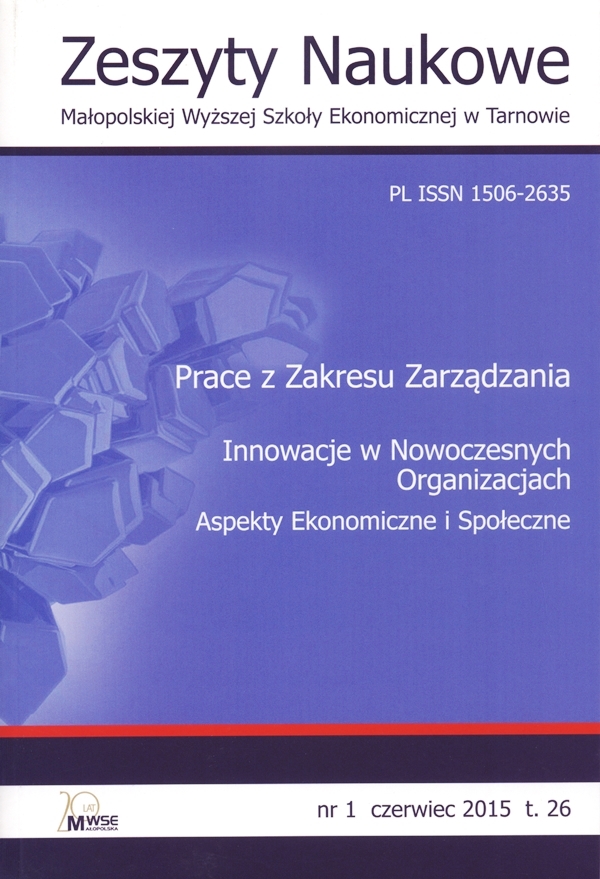Abstract
The purpose of this article is to present the concept of building business models (BM) of modern organizations based on their potential for innovation. Creation of innovation in organization is a complex process that depends on many factors, including the potential which is generated in the past, and make some links with innovative capacity to its current use. Business models synthetically describe the organization’s ability to create value and make profits. Well-prepared BM determines the success in the process of implementation innovation. The study presented in this article is located in the area of discussions around basic skills in the organization, divided into three factors: resources, processes and values that determine the success of innovation. The main question refers to the assessment of the chances of achieving growth through possessed innovation potential. The research in the article includes an assessment of the potential of innovative BM. In particular, it is the analysis of BM used in modern organizations whose business is based on innovation. The author concludes that the BM based on the innovative potential is an important factor of the innovation of modern organizations.
References
Białoń, L. (red.) (2010). Zarządzanie działalnością innowacyjną. Warszawa: Placet. ISBN 978-83-7488-153-1.
View in Google Scholar
Chesbrough, H. (2010). Business Model Innovation: opportunities and barriers. Long Range Planning, 43, 354‒363.
View in Google Scholar
Christensen, C.M., Raynor, M.E. (2008). Innowacje. Napęd wzrostu. Warszawa: Studio Emka. ISBN 978-83-60652-37-4.
View in Google Scholar
Dudzik, T., Witek-Hajduk, M.K. (2007). Model biznesu – moda czy nowa koncepcja zarządzania strategicznego. W: H. Brdulak, E. Duliniec, T. Gołębiowski (red.). Wspólna Europa. Tworzenie wartości przedsiębiorstwa na rynku Unii Europejskiej. Warszawa: Szkoła Główna Handlowa. ISBN 8373783164.
View in Google Scholar
Evers, R., Huibers, T. (2012). 10 New Business Models for This Decade [online, dostęp: 2014-04-03]. Dostępny w Internecie: http://www.slideshare.net/oukearts/10-new-business-models-for-this-decade.
View in Google Scholar
Komorowski, J. (2008). Wartość przedsiębiorstwa a nowy ład gospodarczy w Polsce. W: R. Bartkowiak, J. Ostaszewski (red.). O nowy ład gospodarczy w Polsce (s. 423‒437). Warszawa: Szkoła Główna Handlowa.
View in Google Scholar
Kozioł, L., Karaś, A. (2013). Innovativeness in tourist companies: assessment attempt. The Małopolska School of Economics in Tarnów Research Papers Collection, 23(2), 131‒147.
View in Google Scholar
Łunarski, J., Stadnicka, D. (2007a). Metoda samooceny potencjału innowacyjnego organizacji. Technologia i Automatyzacja Montażu, 4, 37‒41.
View in Google Scholar
Łunarski, J., Stadnicka, D. (2007b). Ocena poziomu konkurencyjności stosowanej technologii. Technologia i Automatyzacja Montażu, 2‒3, 25‒29.
View in Google Scholar
Obłój, K. (2002). Tworzywo skutecznych strategii. Warszawa: PWE. ISBN 83-208-1413-8.
View in Google Scholar
Osterwalder, A., Pigneur, Y. (2012). Tworzenie modeli biznesowych. Podręcznik wizjonera. Gliwice: Wydawnictwo Helion. ISBN 978-83-246-3059-2.
View in Google Scholar
Tidd, J., Bessant, J. (2011). Zarządzanie innowacjami. Integracja zmian technologicznych, rynkowych i organizacyjnych. Warszawa: Wolters Kluwer Polska. ISBN 978-83-264-1181-6.
View in Google Scholar
Weiblen, T., Frankenberger, K., Gassmann, O. (2013). The Open Business Model: Towards a Common Understanding of an Emerging Concept [online, dostęp: 2014-04-03]. Materiały pokonferencyjne 13th EURAM 2013. Dostępny w Internecie: http://www.researchgate.net/publication/256766170_The_Open_Business_Model_Towards_a_Common_Understanding_of_an_Emerging_Concept.
View in Google Scholar
© Copyright by Małopolska School of Economics in Tarnów. The articles are available under the Creative Commons Attribution NonCommercial-NoDerivatives 4.0 International License


